Work life balance is a must for everyone living in the corporate world. The acceptance of the hybrid work model changed the scenario for all businesses and employees. So, to ensure an ethical work environment and reliability, various remote work tools are being used that keep track of all tasks performed by the candidate.
For an entrepreneur, it is necessary to know different work from home technology trends available to guide remote work in an efficient manner. You must have the idea of these tools to manage and monitor tasks finished in a particle format.
Here, we are looking at the top 50 tools divided in 10 categories used for various purposes like communication, HR, performance monitoring, and collaboration.
Top Categorized Remote Work Tools in 2025
Remote Work Tools are crucial for teamwork, communication, and production over long distances. They assist in managing teams for remote work environments, securing data, and streamlining operations:
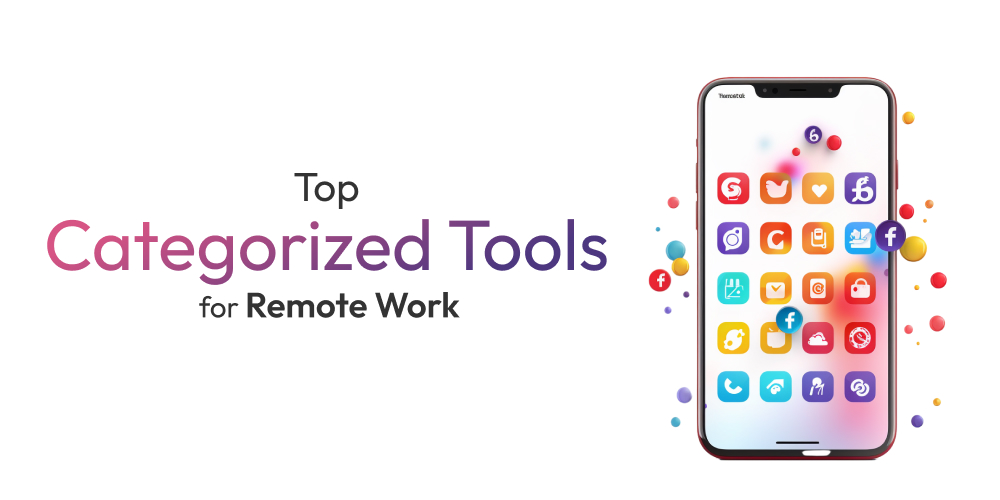
1. Communication Tools
These AI-powered communication platforms keep everyone in real time by enabling team conversations, video conferencing, and instant messaging. Microsoft Teams, Zoom, and Slack are a few examples.
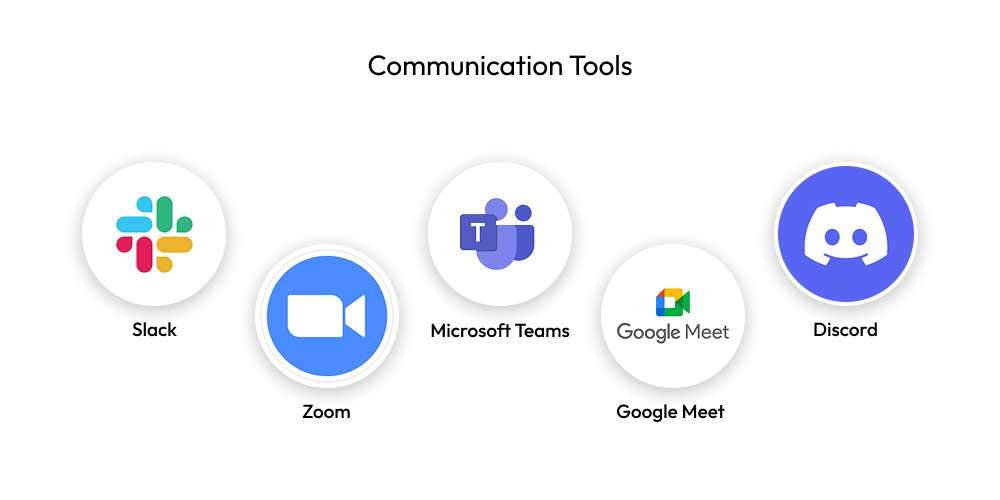
● Slack
Slack is a popular team chat program that provides direct communications and well-organized channels. It enables file sharing, video calls, automation, and integration with hundreds of apps. Slack facilitates productive collaboration and communication between distant teams.
Features:
- Channel-based messaging
- Integration with 2,000+ apps
Industrial Impact: Accelerates cross-functional team communication, reducing internal email dependency
Application: Used by software teams to coordinate code reviews and deployments
● Zoom
Zoom is a popular video conferencing tool for webinars, meetings, and online instruction. It provides HD video quality, breakout spaces, and screen sharing. It is a mainstay of virtual communication because of its simplicity of usage.
Features:
- HD video conferencing
- Breakout rooms
Industrial Impact: Enables scalable remote meetings, fostering virtual client engagement and internal collaboration
Application: Used by universities for conducting online lectures and webinars
● Microsoft Teams
Microsoft Teams is a platform that integrates file sharing, video conferencing, and messaging. It provides real-time collaboration capabilities and connects with Microsoft 365. Businesses can build a remote team that is perfect in using the Microsoft ecosystem.
Features:
- Built-in Office 365 integration
- Persistent chat and file sharing
Industrial Impact: Centralizes productivity and communication in Microsoft-heavy enterprises
Application: Used by corporate HR teams for onboarding new employees remotely
● Google Meet
Google Meet integrates with Google Workspace to provide safe, high-quality video meetings. Screen sharing, recording, and captioning are all supported. It’s a dependable option for brief client meetings and team calls.
Features:
- Browser-based meetings
- Live captions using Google AI
Industrial Impact: Streamlines client communication across browsers and devices
Application: Used by digital marketing teams for remote client presentations
● Discord
Discord, which was first created for gamers, is now used for text, voice, and video communication by remote teams. Channels and role-based permissions are supported. For informal, community-based workspaces, it is well-liked.
Features:
- Voice channels for real-time collaboration
- Threaded discussions
Industrial Impact: Adopted by startups and developer communities for informal collaboration
Application: Used by game development teams for audio-based stand-ups and discussions
2. Project Management Tools
Using visual boards and timetables, they assist teams in organizing, allocating, and tracking activities. Workflow monitoring and accountability are enhanced by apps like Asana and Trello.
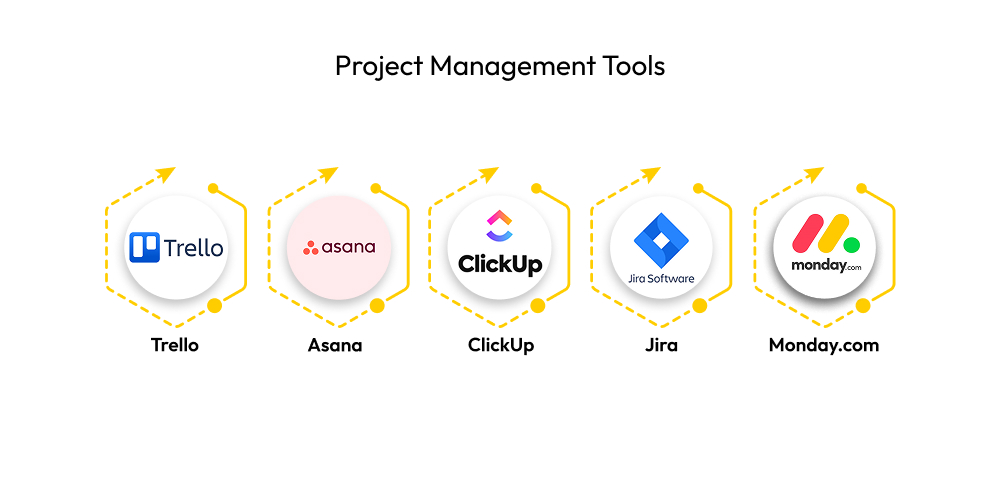
● Trello
Trello organizes tasks and projects using cards, lists, and boards. It is aesthetically pleasing and ideal for workflow and to-do management. Excellent for small groups and individuals.
Features:
- Kanban-style boards
- Power-Ups for automation and integrations
Industrial Impact: Boosts visibility into project progress in marketing and agile teams
Application: Used by marketing agencies to manage content creation pipelines
● Asana
Asana facilitates work management, progress monitoring, and deadline compliance for teams. It provides automated workflows, project templates, and timeline views. Its goal is to increase transparency and productivity.
Features:
- Timeline view for project planning
- Task dependencies
Industrial Impact: Improves cross-team coordination and reduces missed deadlines
Application: Used by design teams to plan and execute campaigns with multiple milestones
● ClickUp
ClickUp is a comprehensive productivity software that includes collaborative tools, time monitoring, and task management. It has many perspectives and is quite customisable. All sizes of teams can use it.
Features:
- All-in-one task, doc, and goal tracking
- Custom dashboards with AI
Industrial Impact: Consolidates work management into a single platform, reducing SaaS bloat
Application: Used by product teams for sprint planning and performance tracking
● Jira
For development teams in particular, Jira is an effective and the best remote work software for agile project management. It facilitates bug tracking, backlogs, and sprints. Tech and DevOps teams utilize it extensively.
Features:
- Agile boards for Scrum/Kanban
- Advanced reporting & issue tracking
Industrial Impact: Streamlines software development workflows for agile teams
Application: Used by engineering teams for bug tracking and sprint management
● Monday.com
A visual work OS for managing tasks, projects, and workflows is offered by Monday.com. It provides dashboards, integrations, and automation. It is scalable and easy to use for any team.
Features:
- Custom workflows
- Time tracking & automation
Industrial Impact: Enhances operational visibility across departments
Application: Used by operations managers to assign and track project timelines
3. Time Tracking Tools
These apps keep track of remote workers’ or freelancers’ billable time, productivity, and working hours. Toggl and Clockify are two examples of tools that help guarantee accurate reporting.
![]()
● Toggl Track
A straightforward yet powerful time-tracking tool is Toggl Track. It provides reporting, real-time tracking, and app connectors. Excellent for distant teams and independent contractors.
Features:
- One-click time tracking
- Detailed productivity reports
Industrial Impact: Enables accurate billing and time audits for remote freelancers and agencies
Application: Used by freelance designers to log client hours for invoicing
● Clockify
Clockify provides a free timesheet and time tracking tools. Reports, billable hours, and team management tools are all included. Perfect for tracking output generated from various data inputs and processed by AI.
Features:
- Time tracking with project tags
- Team productivity dashboard
Industrial Impact: Helps managers monitor remote workforce productivity across multiple projects
Application: Used by software consultancies to measure and optimize developer work hours
● Harvest
Harvest integrates invoicing, expenditure tracking, and time tracking. Trello and Asana are among the tools it interacts with. You can build a remote work management app for project budgeting and client billing.
Features:
- Time tracking with expense reporting
- Invoice generation
Industrial Impact: Simplifies client billing for remote agencies and service providers
Application: Used by creative agencies to manage time and invoice across campaigns
● RescueTime
To increase focus, RescueTime keeps track of how much time is spent on websites and apps. It offers focus groups and thorough productivity reports. Ideal for insights into individual performance.
Features:
- Automatic time logging
- Focus time alerts and goals
Industrial Impact: Supports individual remote workers in managing distractions
Application: Used by remote consultants to analyze personal productivity patterns
● Hubstaff
Hubstaff provides GPS tracking, activity levels, and time monitoring with screenshots. It’s perfect for monitoring employees remotely. enables invoicing and payroll as well.
Features:
- Time tracking with screenshots
- GPS and activity monitoring
Industrial Impact: Enhances accountability and security for distributed teams
Application: Used by outsourcing firms to oversee virtual assistant tasks
4. File Sharing & Storage Tools
For smooth teamwork, they provide real-time file sharing and safe cloud storage. Dropbox and Google Drive are popular tools for remote file management and access.
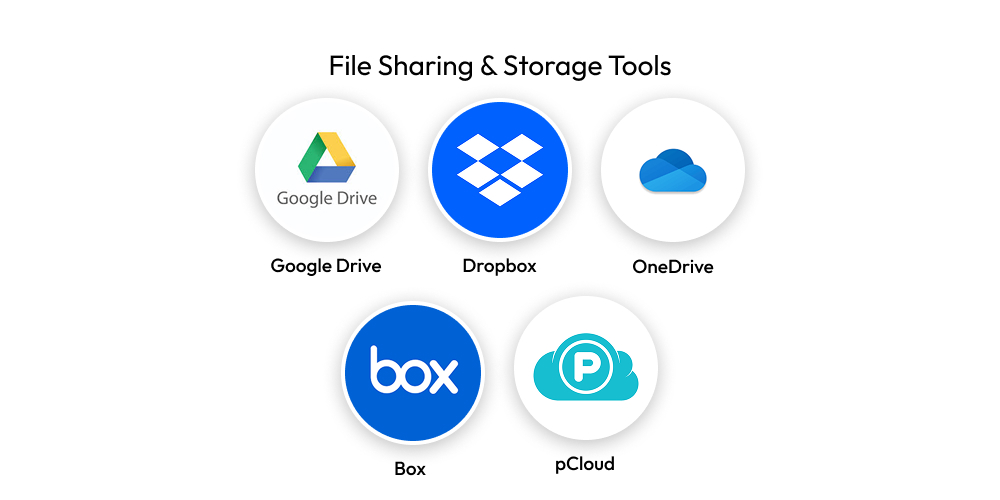
● Google Drive
Cloud storage and simple file sharing within Google Workspace are features offered by Google Drive. Real-time collaboration on Docs, Sheets, and Slides is supported. ideal for managing documents remotely.
Features:
- Cloud-based file storage and sharing
- Real-time collaboration on Docs, Sheets and Slides
Industrial Impact: Centralizes document access and enhances team collaboration
Application: Used by remote finance teams for live budget spreadsheet collaboration
● Dropbox
Dropbox enables device syncing, cloud storage, and safe file sharing. It provides third-party tool integration and team folders. extensively utilized for collaboration and document backup.
Features:
- Secure file syncing and backup
- Third-party integration with Slack and Zoom
Industrial Impact: Ensures secure and reliable remote document sharing
Application: Used by law firms for sharing client case files securely
● OneDrive
Microsoft OneDrive is a cloud storage solution that is connected with Microsoft 365 and Windows. It provides synchronizing, version control, and safe sharing. Perfect for companies who use Microsoft products already.
Features:
- Microsoft 365 document sync
- File version history and restoration
Industrial Impact: Strengthens collaboration in Microsoft ecosystems for hybrid teams
Application: Used by remote HR departments for storing confidential employee records
Interested in a chatbot demo, pricing, or more info? Fill out the form our expert will contact you shortly.
-
Chatbot Demo
-
Cost to Develop an app
-
Industry Report
-
Case Study
● Box
Box is a platform for cloud content management that facilitates safe file storage and teamwork. It provides data compliance and workflow automation. Enterprise teams use it extensively.
Features:
- Enterprise-level security and compliance
- Collaborative file editing
Industrial Impact: Offers scalable cloud storage for highly regulated industries
Application: Used by healthcare providers to share HIPAA-compliant files securely
● pCloud
pCloud offers encryption and lifetime options for safe cloud storage. It provides backups, file sharing, and media playback. Excellent for users that value their privacy.
Features:
- Client-side encryption
- Media playback and backup tools
Industrial Impact: Offers secure file storage for creatives and freelancers
Application: Used by video editors to store and stream high-resolution media files remotely
5. Collaboration Tools
Through shared documents or whiteboards, these AI collaboration tools facilitate idea exchange, brainstorming, and co-authoring. Miro and Notion are well-liked options for organized and imaginative teamwork.
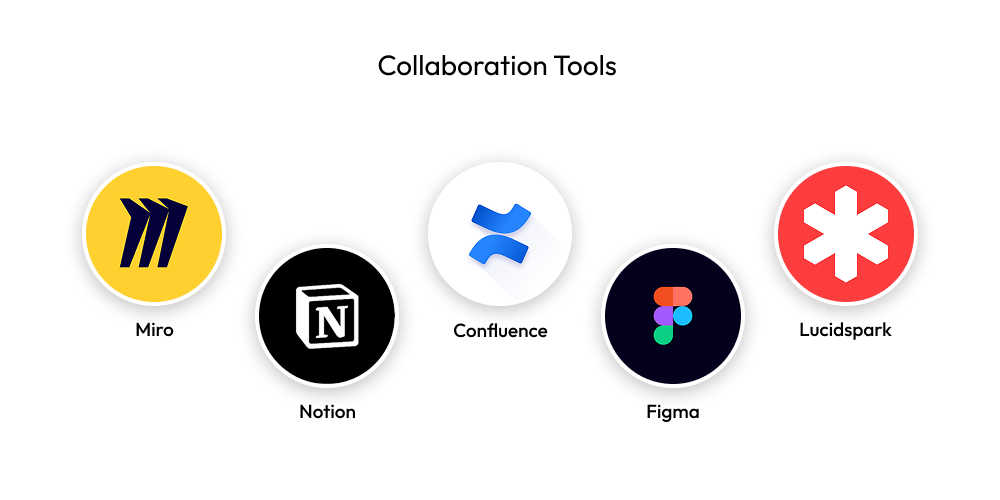
● Miro
Miro is an online whiteboard that facilitates visual collaboration, mind mapping, and brainstorming. It is compatible with templates, diagrams, and sticky notes. Perfect for distant creative teams.
Features:
- Infinite online whiteboard
- Pre-built templates for brainstorming and workflows
Industrial Impact: Boosts remote creativity and ideation across product and UX teams
Application: Used by design teams to map user journeys collaboratively
● Notion
Notion is a workspace that integrates task management, wikis, databases, and notes. It is adaptable and scalable for both individuals and groups. This tool is extensively employed in knowledge management.
Features:
- All-in-one notes, wikis, and tasks
- Real-time multi-user editing
Industrial Impact: Replaces multiple productivity tools with a unified remote workspace
Application: Used by startups to manage product documentation, sprints, and team goals
● Confluence
Atlassian offers a collaboration wiki called Confluence. It is intended for the creation, arrangement, and exchange of documentation. This tool is frequently combined with Jira.
Features:
- Team workspace for project docs
- Integration with Jira and Trello
Industrial Impact: Streamlines knowledge sharing across distributed software teams
Application: Used by enterprise engineering teams for technical documentation
● Figma
Figma is among the best web-based and virtual team collaboration tools for UI/UX collaboration. It enables real-time collaboration between several people on the same design. Figma is popular among various design teams.
Features:
- Collaborative interface design
- Prototyping with real-time feedback
Industrial Impact: Accelerates design-to-development handoffs in remote-first companies
Application: Used by UI/UX teams to create and share interactive prototypes
● Lucidspark
A virtual whiteboard for group planning and brainstorming is called Lucidspark. It provides integrations, freehand drawing, and sticky notes. Excellent for brainstorming sessions.
Features:
- Visual collaboration with sticky notes and voting
- Team cursors and breakout boards
Industrial Impact: Enhances virtual workshops, planning, and brainstorming sessions
Application: Used by remote product teams for sprint retrospectives and planning
6. HR & Payroll Tools
For remote teams, these platforms manage payroll, attendance, employee onboarding, and compliance. Gusto and Deel make managing a worldwide workforce easier.
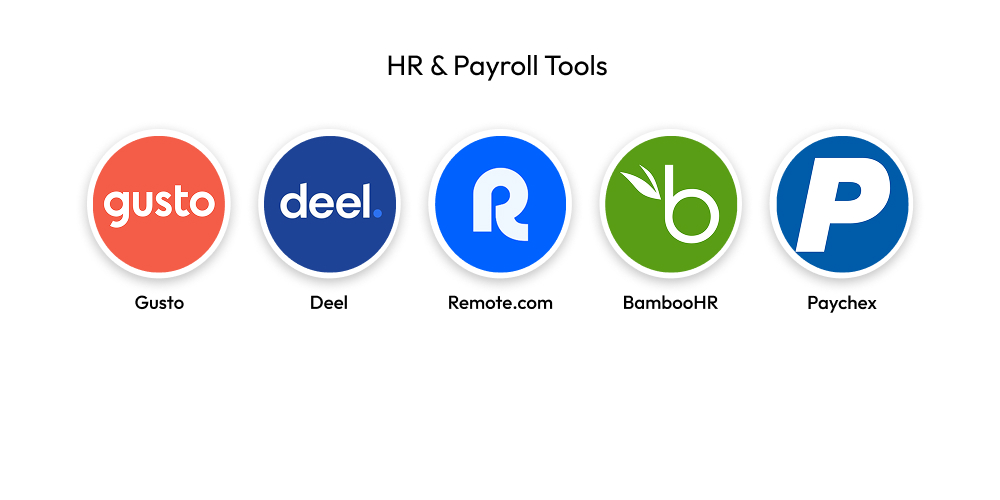
● Gusto
Gusto is a platform that combines payroll, benefits, and human resources. It makes direct deposits, tax filing, and onboarding easier. Ideal for small and medium-sized enterprises.
Features:
- Automated payroll processing
- Employee benefits and onboarding tools
Industrial Impact: Simplifies HR and finance operations for remote-friendly SMBs
Application: Used by remote-first companies to manage global payroll and compliance
● Deel
Deel helps businesses manage, pay, and hire remote workers throughout the world. It manages foreign payments, contracts, and compliance. This tool is vital for managing HR across borders.
Features:
- Global payroll and compliance
- Contractor agreement generation
Industrial Impact: Makes it easy for companies to legally hire international remote workers
Application: Used by SaaS startups to pay freelancers across different countries
● Remote.com
For remote teams, Remote.com provides payroll, HR, and compliance solutions. It makes managing benefits and hiring internationally easier. A good option for multinational companies.
Features:
- Global employment platform
- Integrated HR, tax, and benefits tools
Industrial Impact: Helps scale global remote teams without establishing local entities
Application: Used by tech companies to employ talent in multiple countries
● BambooHR
An HR program called BambooHR is used to manage employee performance and statistics. It provides integrations, reports, and onboarding. Businesses can avail job portal development services for developing similar tools that are centered on small and medium-sized enterprises.
Features:
- Centralized employee database
- Time-off tracking and performance reviews
Industrial Impact: Optimizes remote HR operations and performance management
Application: Used by HR teams in remote-first firms to streamline onboarding and feedback cycles
● Paychex
Paychex offers HR, benefits, and payroll services to companies of all sizes. It has capabilities for employee self-service and tax compliance. Perfect for remote teams in the United States.
Features:
- Payroll, HR, and benefits management
- Mobile employee self-service
Industrial Impact: Automates compliance-heavy tasks for remote and hybrid teams
Application: Used by midsize companies to manage employee tax filings and salary disbursement
7. Virtual Desktop Tools
Through cloud-hosted desktops, they offer remote access to office software and systems. Secure remote computing is made possible by products like Citrix and Amazon WorkSpaces.
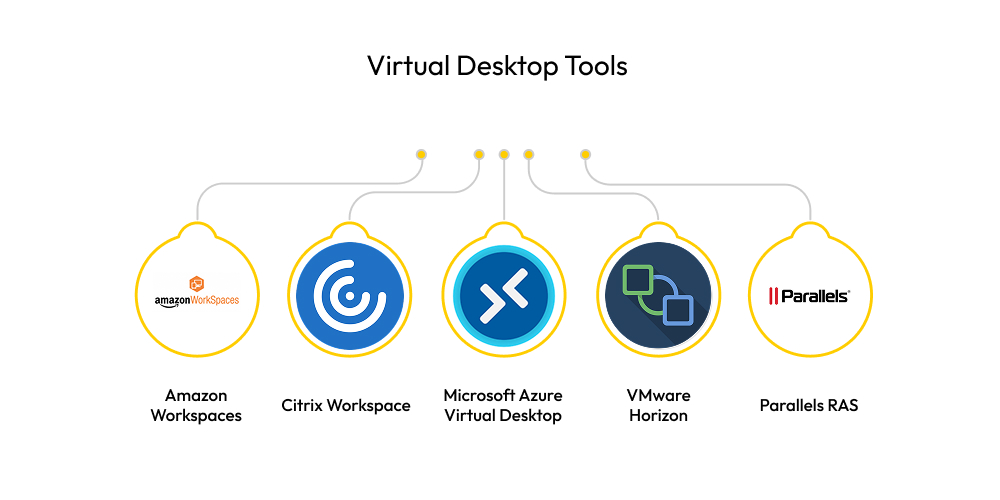
● Amazon WorkSpaces
One cloud-based virtual desktop infrastructure (VDI) option is Amazon WorkSpaces. AI in workplace collaboration offers scalable, safe access to workspaces. Ideal for businesses with remote IT requirements.
Features:
- Cloud-based virtual desktops
- Secure access to persistent user environments
Industrial Impact: Enables scalable remote desktop infrastructure for enterprise IT
Application: Used by remote developers for secure access to pre-configured work environments
● Citrix Workspace
Citrix Workspace provides high-performance, secure remote desktop and app delivery. Both user mobility and centralized management are supported. Large organizations trust them due to their high scalability.
Features:
- Unified digital workspace
- App and data virtualization with enhanced security
Industrial Impact: Supports secure remote access to legacy enterprise applications
Application: Used by financial institutions for secure remote access to core banking software
● Microsoft Azure Virtual Desktop
A scalable and safe virtual desktop experience is provided by Microsoft Azure Virtual Desktop. It is compatible with Active Directory and Microsoft 365. This is made for hybrid and remote teams.
Features:
- Windows virtual desktops in Azure
- Integration with Microsoft 365
Industrial Impact: Powers secure virtual workstations for globally distributed teams
Application: Used by call centers to set up virtual agents on cloud desktops
● VMware Horizon
Infrastructure for virtual desktops and app delivery is offered by VMware Horizon. It makes improved security and centralized administration possible. This is a tool typical in business IT environments.
Features:
- Desktop and app virtualization
- Smart policies and encrypted connections
Industrial Impact: Offers scalable desktop virtualization for regulated industries
Application: Used by healthcare organizations for secure EMR access remotely
● Parallels RAS
Applications and virtual desktops can be accessed remotely thanks to Parallels RAS. It provides multi-platform access and is simple to deploy. This tool is renowned for dependability and simplicity.
Features:
- Remote app and desktop delivery
- Centralized management console
Industrial Impact: Simplifies delivery of Windows and Linux applications to remote users
Application: Used by educational institutions to deliver lab software to remote students
8. Cybersecurity Tools
These solutions manage user access remotely, safeguard critical data, and guarantee secure connections. Firewalls, VPNs, and endpoint security programs like NordLayer are necessary.
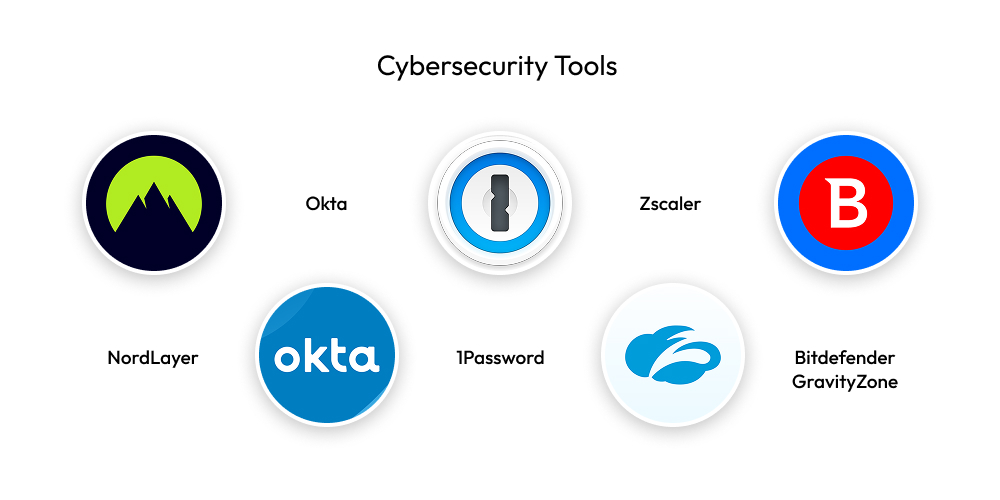
● NordLayer
NordLayer provides enterprise VPN solutions for safe distant network access. IP whitelisting and encrypted connections are guaranteed. Perfect for protecting data from a remote team.
Features:
- Secure remote access with VPN
- Zero Trust Network Access (ZTNA)
Industrial Impact: Provides IT security for distributed and hybrid teams
Application: Used by digital agencies to protect internal tools from cyber threats
● Okta
SSO and MFA are among the identity and access management capabilities offered by Okta. It assists companies in providing remote workers with secure app access. This tool provides a security key for authentication.
Features:
- Single sign-on (SSO)
- Multi-factor authentication (MFA)
Industrial Impact: Ensures identity and access management in remote-first companies
Application: Used by SaaS firms to manage secure logins for 3rd-party and in-house apps
● 1Password
A password manager called 1Password protects login information for all teams. It provides breach warnings, two-factor authentication, and shared vaults. Excellent for securely managing login information.
Features:
- End-to-end encrypted password vault
- Admin console for teams
Industrial Impact: Strengthens credential management and reduces password-related breaches
Application: Used by remote sales teams to securely share client credentials and API keys
● Zscaler
Zscaler is a platform for cloud security that safeguards user access and traffic. It makes internet security and zero-trust architecture possible for remote workers. Businesses use it to protect their networks.
Features:
- Cloud-native security gateway
- Zero Trust architecture for remote access
Industrial Impact: Protects remote traffic from malware, data leaks, and threats
Application: Used by enterprises to inspect and secure remote traffic without VPNs
● Bitdefender GravityZone
Bitdefender GravityZone is an antivirus, threat detection, and endpoint protection platform. It provides automation and centralized control. IT departments rely on it to protect remote devices.
Features:
- Endpoint protection and risk analytics
- AI-powered threat detection
Industrial Impact: Offers centralized cybersecurity for remote endpoints
Application: Used by IT departments to secure laptops used by remote employees
9. Performance Management Tools
They are used to define objectives, monitor staff development, and conduct AI-enhanced remote work. Lattice and 15Five are two examples of tools that improve team engagement and performance.
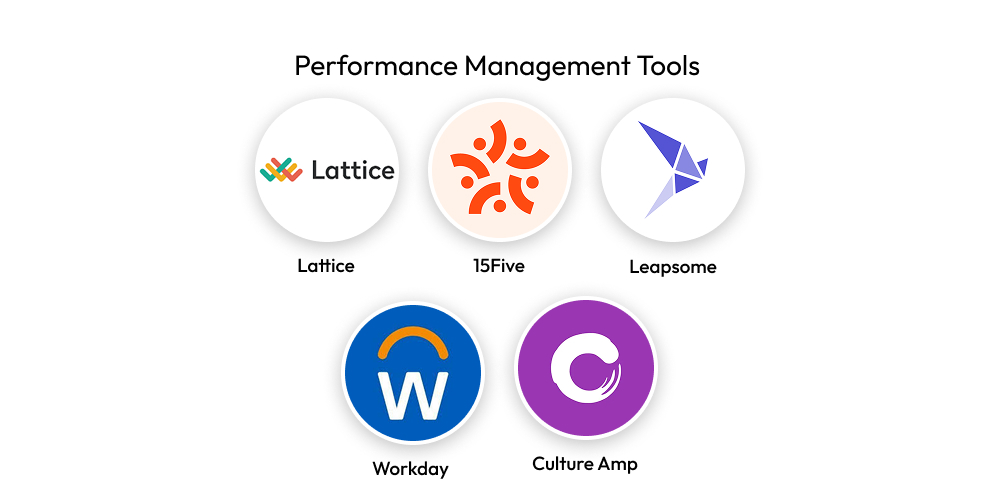
● Lattice
Lattice is a platform for performance management that offers engagement features, goal tracking, and feedback. It improves growth culture and openness. The tool is utilized by remote-first businesses.
Features:
- Performance reviews and goal tracking
- Get 1-on-1 meeting agendas
Industrial Impact: Enhances employee engagement and performance in remote settings
Application: Used by people ops teams to run quarterly performance evaluations
● 15Five
15Five uses feedback loops, one-on-one meetings, and check-ins to support employee performance. It facilitates managers’ communication with distant teams. This tool emphasizes morale and alignment.
Features:
- Weekly check-ins and feedback
- OKR tracking and pulse surveys
Industrial Impact: Fosters a culture of continuous feedback and accountability
Application: Used by remote managers to track team sentiment and productivity
● Leapsome
Leapsome provides learning resources, performance evaluations, and OKRs all on one platform. It enhances worker engagement and growth. Excellent for expanding remote teams.
Features:
- Performance and learning management
- Goal alignment with 360° feedback
Industrial Impact: Empowers personal growth and performance in distributed teams
Application: Used by HR teams to integrate learning paths with performance reviews
● Workday
Workday offers planning, financial, and human resources software at the corporate level. Payroll, analytics, and talent management are all supported. It is beneficial to use AI development services to create ideal platforms for big and international businesses.
Features:
- Cloud-based ERP for HR and finance
- Real-time analytics and workforce planning
Industrial Impact: Provides enterprise-grade HR and finance systems for remote organizations
Application: Used by global corporations to manage workforce operations and compensation
● Culture Amp
A platform for employee engagement, performance, and growth is called Culture Amp. It facilitates the collection of insights via questionnaires and comments. This is used to create productive remote work environments.
Features:
- Employee engagement surveys
- Actionable analytics on workplace culture
Industrial Impact: Improves retention and morale across remote-first teams
Application: Used by executives to measure and act on employee engagement metrics
10. Automation & Workflow Tools
These solutions streamline operations by integrating various apps and automating repetitive procedures. Efficiency is increased and manual labor is decreased with Zapier and Make (Integromat).
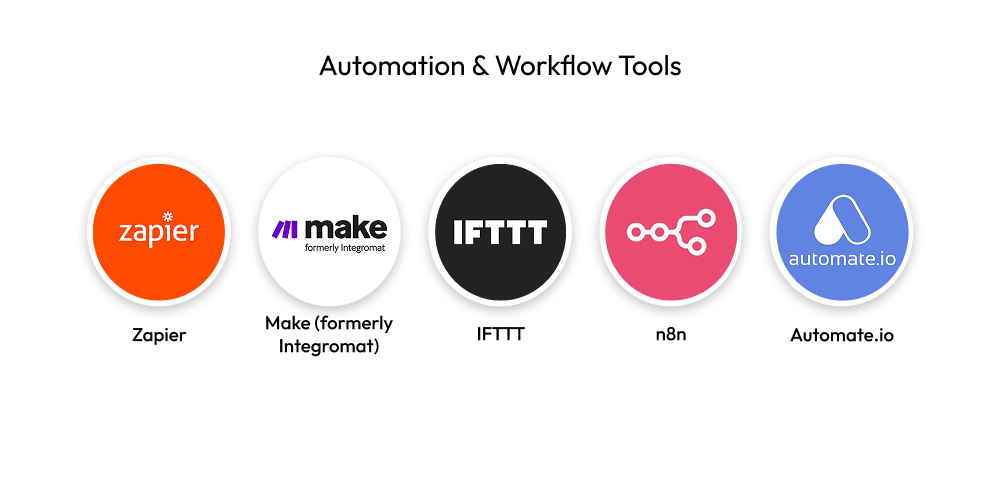
● Zapier
Without knowing any code, Zapier connects apps and streamlines processes. It assists distant teams in cutting down on monotonous work. This tool is widely employed to increase productivity.
Features:
- Workflow automation across 6,000+ apps
- No-code triggers and actions
Industrial Impact: Saves hours of manual tasks, boosting productivity in remote teams
Application: Used by marketers to automate lead data transfer between tools
● Make (formerly Integromat)
Make, earlier known as Integromat, is a platform for visual automation that links services and applications. It facilitates the execution of intricate workflows in real time. Perfect for deep automation for technical users.
Features:
- Visual workflow builder
- Advanced multi-step automation
Industrial Impact: Enhances automation for complex processes across cloud tools
Application: Used by operations teams to automate invoice processing and data syncs
● IFTTT
If This Then That, or IFTTT, establishes basic conditional automations between applications. It supports a large number of integrations and is easy to use. Excellent for automating business and personal tasks.
Features:
- Applets for simple conditional workflows
- Smart device integrations
Industrial Impact: Connects apps and services for enhanced remote tech ecosystems
Application: Used by solopreneurs to automate calendar updates and email alerts
● n8n
n8n is an open-source application for automating workflows that has unique integrations and logic. Workflows based on APIs and self-hosting are supported. Ideal for advanced users and developers.
Features:
- Open-source workflow automation
- Self-hosted data counter
Industrial Impact: Supports privacy-focused automation for security-conscious teams
Application: Used by developers to build custom integrations without compromising data sovereignty
● Automate.io
Cloud apps can be connected with Automate.io, a no-code automation platform. AI productivity tools for remote teams allows CRM workflows, email automation, and data syncing. This tool is beneficial to sales and marketing teams.
Features:
- Drag-and-drop automation
- Pre-built bots for CRM, email, and productivity tools
Industrial Impact: Accelerates business process automation for remote SMEs
Application: Used by sales teams to auto-sync form submissions to CRMs
In a Nutshell!!
The future of remote work is safely handled by these tools that we have discussed in the above section. They provide productivity, trust, efficiency, and flexibility by creating a virtual business environment. These remote work tools like Google Meet, Jira, Workday, and others deliver a seamless working experience that enhance task management.
By using such platforms, businesses can easily manage remote coders effectively by assigning them tasks and getting feedback. The implementation of such working tools in the business environment multiplies revenue and encourages users to build trust in the services. So, it is beneficial to use them for the benefit of your business growth.
FAQs
1. What are AI-Enhanced Remote Work Tools?
Artificial intelligence is used by AI-enhanced remote work solutions to increase output, automate processes, and facilitate communication in geographically dispersed teams. Features like intelligent scheduling, language translation, real-time insights, and content recommendations are all possible.
2. How is AI Transforming Collaboration in Remote Work?
- Automates meeting notes with intelligent assistants.
- Enhances communication through real-time translation.
- Boosts productivity with predictive analytics.
3. Are AI-Powered Tools Secure for Remote Teams?
Strong security features like access control, safe cloud storage, and data encryption are present in the majority of AI-powered tools. Prominent platforms adhere to regulations like SOC 2, GDPR, and HIPAA. Teams should still perform routine audits and evaluate privacy rules, though.
4. What are Examples of Popular AI-Enhanced Remote Work Tools in 2025?
- Microsoft Teams with Copilot – Offers smart meeting summaries.
- Notion AI – Assists with auto-generating content.
- Zoom IQ – Provides real-time meeting insights.
5. Can Small Businesses Benefit from AI-Driven Remote Work Tools?
Yes, AI systems that automate repetitive processes, enhance communication, and lighten workloads can be very helpful to small firms. Without the need for sizable IT personnel, these products maximize team effectiveness and save time. Affordably priced plans designed for small teams are also available.
6. What Should Teams Consider Before Adopting AI-Powered Remote Work Tools?
- Ensure the tool follows regulations like GDPR.
- Check if it integrates with your existing tools.
- Choose user-friendly platforms.
































